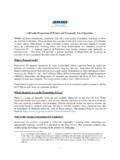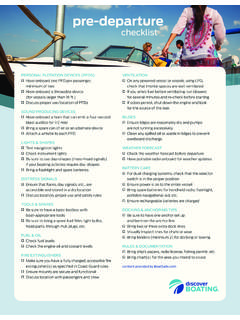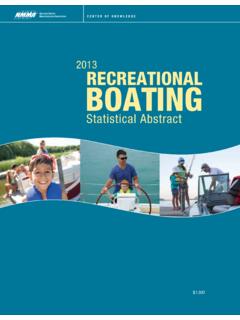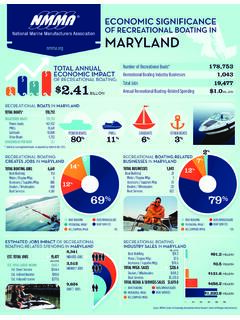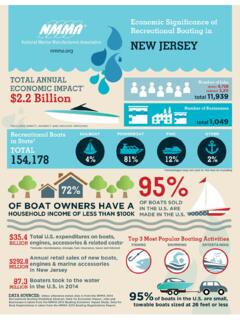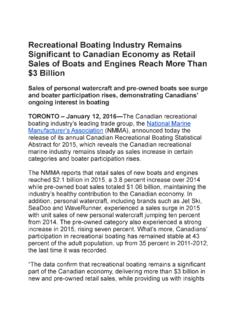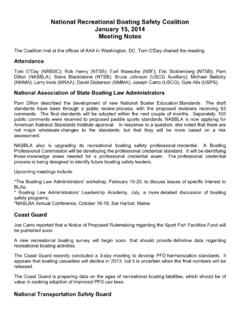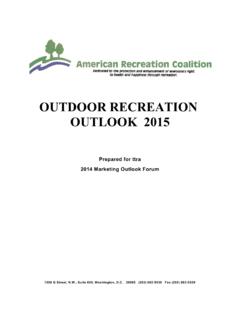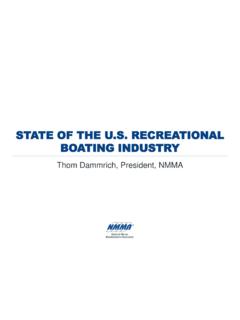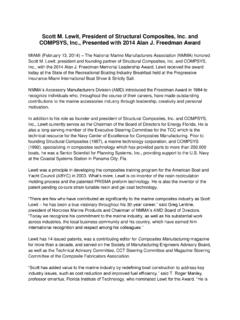Transcription of August 5, 2014 Mr. James Rajotte, MP (Edmonton ... - nmma.net
1 August 5, 2014 Mr. James Rajotte, MP (Edmonton--Leduc) Chair, House of Commons Standing Committee on Finance House of Commons Ottawa, ON K1A 0A6 Subject: 2014 Pre-Budget Consultation Dear Mr. Rajotte, The national Marine manufacturers association (NMMA) is the leading association representing the recreational boating industry in North America. NMMA member companies produce more than 80 percent of the boats, engines, trailers, accessories and gear used by boaters and anglers throughout the United States ( ) and Canada. NMMA is dedicated to industry growth through programs in public policy advocacy, market statistics and research, product quality assurance and promotion of the boating lifestyle.
2 For more information, you can visit or The recreational boating sector contributes significantly to the Canadian economy. In 2013 approximately 15 million Canadians, 44% of the population, participated in recreational boating activities. There are an estimated million boats in use in Canada. Total revenues generated by the core of the recreational boating industry totaled $ billion in 2012 and annual GDP impact of recreational boats in Canada is close to $5 billion, with retail sales for new boats and outboard engines generating almost $2 billion in revenues in 2013.
3 Additionally, nearly 70,000 Canadians are employed by the recreational boating industry. On behalf of NMMA s members across Canada, I am very pleased to provide the following recommendations for consideration as part of your Committee s deliberations in advance of the 2015 federal budget. 1.) Support for the Office of boating Safety (OBS) It is vitally important to refrain from further cuts to Transport Canada and specifically its activities related to boating safety. Departmental staff and resources have been significantly reduced in recent months, resulting in the OBS being merged with another section (focused on commercial marine issues) and leading to less capacity and oversight for recreational boating issues.
4 2.) Maintain Parks Canada length of season/hours of operation and ensure fees are used to stimulate economy On May 14, 2013, Parks Canada announced that recreational lockage fees along Canada's historic canals would remain frozen for the next three years at 2008 levels. NMMA believes funding should continue to be allocated to Parks Canada to mitigate substantial fee increases in the future. On June 23, 2014 , Hon. Leona Aglukkaq, Minister of the Environment responsible for Parks Canada, announced an extension to the hours of operation for both the Rideau Canal and Trent-Severn Waterway for a total of 112 hours to be added to the navigation schedule throughout the course of the entire boating season.
5 The extended hours of service encourages boaters to travel these historic waterways, boosting tourism and supporting an industry which generates $ billion in revenues and employs nearly 70,000 people in Canada each year, as mentioned above. With these revised hours of operation, our industry has even more opportunity to grow and continue contributing to the Canadian economy. NMMA is very supportive of this recent decision by the federal government and have communicated our support to many federal Parliamentarians and officials and we hope that the current hours of operation will remain over the long-term.
6 Many direct/indirect businesses (marinas, tourism operators, hotels, etc) rely on lockage fees. While we realize that fee increases are necessary, we would hope to work with the Government of Canada to ensure that the revenues derived from fees will be directed towards capital/operational improvements to facilitate boater traffic and thereby stimulate the economy. 3.) Eliminate trade barriers and continue to work towards regulatory harmonization between Canada and the United States 128,490 recreational boats were imported into Canada in 2012, reaching a 4-year high The recreational boating industry relies on international trade to support its business.
7 Trade barriers hinder Canadian recreational manufacturers from exporting their best-in-class products between Canada and the Further growth of the recreational boating industry can be realized through new regulatory developments aimed at mutually-recognized engine and boat construction standards. Work has already been done through the Regulatory Cooperation Council process to streamline some of these regulations and we hope that will continue. NMMA also believes in furthering regulatory harmonization efforts across all transport modes (including marine) as per the Beyond the Borders Plan & the Regulatory Cooperation Council which will thereby result in greater productivity and cross-border business opportunities for our industry and many others.
8 Furthering work focused on aligning regulations (life jackets, boat construction standards) is important to our membership and industry. Regulatory harmonization across all transport modes (including marine) as per the Beyond the Borders Plan will result in greater productivity and cross-border business opportunities for our industry, creating more Canadian jobs. Moreover, if a Canadian engine manufacturer imports a number of units from their plant in the , they are required to pay NAFTA duties which arise from stringent and outdated rules of origin.
9 However, in cases where an individual consumer is importing a final product (ie. a boat) labeled as Made in the , the individual arriving at customs is permitted to import the product into Canada under preferential market access. Thus, it is more lucrative for a Canadian consumer to purchase a product in the US at a less expensive, duty-free price, than it is to make the same purchase in Canada. Domestically, the same product will have a higher price tag-a result of the manufacturer having to pass on to consumers the higher cost of importing product subject to NAFTA duties.
10 Canada and the United States need to establish a level playing field so that individual consumers are subject to the same NAFTA duties as Canadian manufacturers . The existing discriminatory tariff regime, applied to the boating industry writ large, places Canadian manufacturers and distributors at a comparative disadvantage, while indirectly supporting American counterparts. In addition to reducing barriers, NMMA would like to request the Department of Foreign Affairs, Trade and Development Canada s continued support through the Global Opportunities for Associations program helping the recreational boating industry explore international trade opportunities abroad.

